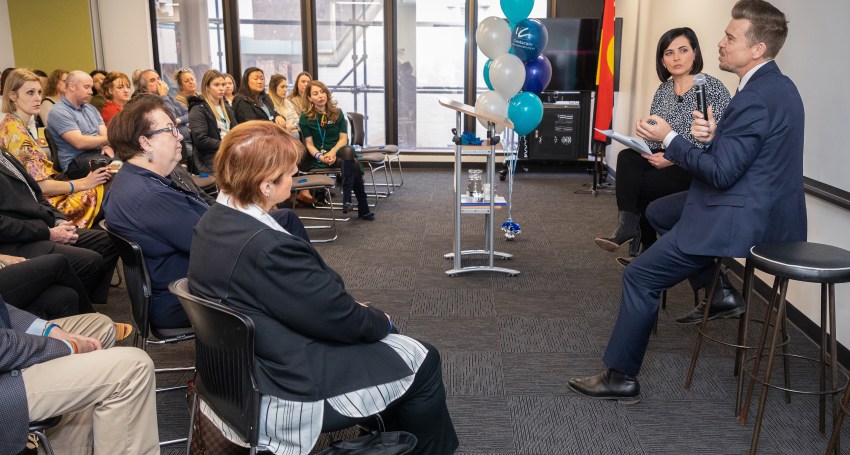Report highlights challenges for social workers
News
Not checking work emails or phone calls at home, taking her dog for a walk and turning the music up nice and loud are just some of the ways senior social worker Sarah Carruthers copes with her demanding job of helping families who are in crisis.

Working on the frontline for Centacare Catholic Family Services’ Targeted Intervention Service means that Sarah has to deal with some confronting issues in her daily job.
And according to a recently released report, this puts her at risk of vicarious trauma – when the traumatic experience of a person is transferred to, or taken on by, a person who helps or cares for them.
The Understanding Vicarious Trauma report was commissioned by Centacare and undertaken by the Australian Alliance for Social Enterprise, based at the University of South Australia. Launched during National Child Protection Week, the report explored the cumulative stress, fatigue and trauma in a frontline community services setting.
“With the rapid expansion of the community services sector over the past few decades, this represents a ‘ticking timebomb’. Frontline workers are experiencing high levels of trauma that will impact their everyday lives well into the future,” the report said.
“They represent a generation of veterans who are not returning from war, but from working within vulnerable communities and families within our cities, suburbs and regions. This situation cannot and should not be ignored.”

Sarah Carruthers
As Sarah told The Southern Cross, most of the families she works with are “in crisis” or need some form of support.
“We’re going out ‘blind’ essentially, assessing their needs in their home,” she explained.
“The state of the home can sometimes be really in your face. There are children who are living in squalor and they don’t know anything different.
“A lot of the time mum and dad will struggle with mental health, there will be drug and alcohol concerns, they are living in public housing that hasn’t been fixed or looked after for years.
Advertisement
“It can be quite confronting…the smell, seeing children in this state, and you have to keep calm and respectful because you’re in someone else’s house.”
A social worker for nearly 15 years, Sarah said she was aware of the long-term impact these conditions could have on workers in the field, but since joining Centacare seven years ago she felt “fully supported” in her job.
“Unrealistic expectations, high caseloads – that’s the type of thing that makes you not sleep at night, whereas at Centacare there are lower caseloads, the support is wraparound… we’re really lucky,” she said.
“As a senior practitioner it’s about looking after the members of my team, checking in with them. Just looking after each other is probably the key thing we have to do.”
That could mean a cup of tea with some “biscuits, cake, lollies or chocolate” and discussing “what we did well, what we could do better next time”.
On a personal level, Sarah said she made a conscious effort to separate work from home life.
Advertisement
“I don’t check my phone or emails when I get home. I put music on, think about what I’m going to cook for dinner, walk the dog and get some fresh air – it’s about resetting yourself.”
Noting that Centacare provides a “supportive workplace environment” for its staff, the report identified a number of key protective factors for staff.
They included the importance of work satisfaction; building informal support networks; ensuring enough time between matters during the day; setting boundaries between work and home; and celebrating small wins.
The full report is available on Centacare’s website: http://www.centacare.org.au/








Comments
Show comments Hide comments